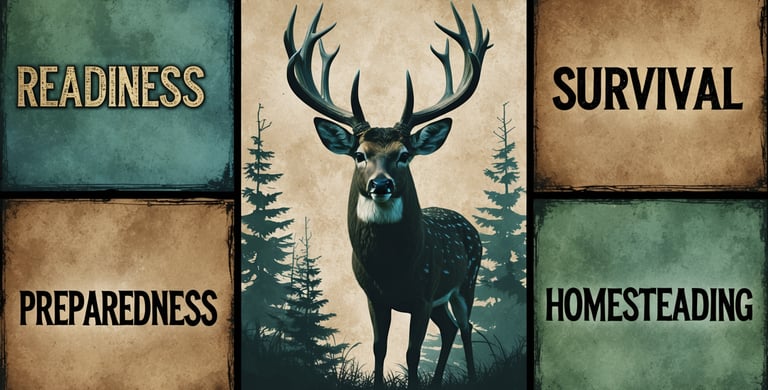Readiness: Medical Readiness and First Response
When Seconds Matter, the Untrained Die
4FORTITUDER - READINESS, SURVIVAL, PREPAREDNESS, HOMESTEADING
Readiness: Medical Readiness and First Response
When Seconds Matter, the Untrained Die
“In times of peace, prepare for war; in times of war, prepare for wounds.”
— Paraphrased from Vegetius
Blood Doesn’t Wait for an Ambulance
There are moments when everything freezes—except the blood.
Someone collapses. A limb is severed. A chest wheezes, drowning in its own air. In those moments, the man who steps forward is not the one with credentials—but the one who trained when no one else did.
Medical readiness is not about replacing doctors. It is about the minutes before they arrive—if they arrive. It is the sacred art of buying time with competence.
Zen master Takuan said, “The man who sees death in every breath lives with clarity.” First response is not about fear. It is about calm readiness in the presence of death.
Core Knowledge Foundation: The Chain of Survival
Medical readiness is the integration of first response, trauma triage, and prolonged field care. It bridges the time between injury and professional care. Your hands become the hospital. Your decisions become the surgery.
Core Components:
M.A.R.C.H. Protocol: Massive bleeding, Airway, Respiration, Circulation, Head/Hypothermia
Basic Trauma Kit: Tourniquet, pressure dressing, chest seals, gloves, shears, NPA (nasopharyngeal airway)
Scene Safety & Triage: You’re not a hero if you die trying. Assess before you act.
Prolonged Field Care Basics: Clean wound care, hydration, improvised splints, vital monitoring
Misconception Warning: CPR alone won’t save you. You need trauma care skills. You need field skills. You need composure.
Advanced Insights: The Physiology of Panic and the Discipline of Care
Most men freeze not from cowardice—but from ignorance. The body dumps adrenaline. Hands shake. Time dilates. Memory fails. The difference between life and death in those moments is preparation under pressure.
Historical Anchor: Battle of Mogadishu (1993)
U.S. forces were ambushed. Medical supplies were limited. Soldiers used shoelaces as tourniquets. One medic performed a field blood transfusion—using a plastic IV line and an empty syringe. Not because it was ideal—but because something is always better than nothing, if you know what to do.
Train to override panic:
Tourniquet under 20 seconds blindfolded.
Apply chest seal on yourself or another under 60 seconds.
Run, drop, treat simulated wounds under breath control.
It doesn’t have to be pretty. It has to work.
Tactical Drill:
Once per month, simulate a traumatic injury with a training partner:
Identify injury (bleed, puncture, fracture)
Time your response
Review each step of MARCH with real gear
Critical Perspectives: The Comfort Lie of Outsourcing
Adversarial Viewpoint:
“Medical training is for professionals. That’s what EMTs and hospitals are for. Trying to do this yourself is dangerous and unnecessary.”
Response:
Hospitals are minutes away. Death happens in seconds. Medical response is a civic discipline, not a career gate. In combat zones, in remote places, or when systems collapse—you are the first responder.
Wisdom and Warning Duality:
When Followed: You become the man who steadies the room. You become the reason someone sees another day.
When Ignored: You watch helplessly. You scream for help that doesn’t come. And you carry the weight of what you could have known.
Strategic Crossroad: Will you depend on sirens—or become the one others call?
Final Charge & Implementation
Brother, your hands were made to heal as well as build. Your mind was made for precision as well as power. Medical readiness is not beneath you—it is part of your rite of passage.
Start Now:
Build and Carry Your IFAK (Individual First Aid Kit)
“Every warrior carries the tools of the wounded.” — Tactical Medic’s Creed
Tourniquet, chest seal, NPA, gloves, shears, gauze. Carry it in your bag, car, and at home.Train Quarterly in Live Scenarios
“Preparedness fades without friction.” — Field Trauma Instructor
Find a Stop the Bleed or tactical trauma course. Practice on dummies. Apply under stress.
Strategic Reflection:
If your child was bleeding out, how many seconds would you waste grabbing your phone instead of grabbing gauze?
Existential Challenge:
You prepare to kill if needed—why not prepare to keep someone alive?
Do not wait until the screams echo. Train now. Carry always. Act swiftly. And never be the man who says, “I didn’t know what to do.”
“The body is fragile. The man who preserves it with discipline becomes a pillar in a crumbling world.”


